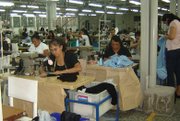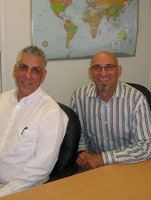Taking the Sample Offshore
When Herb Yussim decided to get out of the private-label business, he reviewed his assets: a lifetime of apparel production experience, numerous contacts in the contemporary and young designer market and a factory in El Salvador.
That’s when he began to think small—as in sample-size small.
Eighteen months ago, Yussim launched his business, Designer Sample Room, with the sole purpose of providing duplicate samples for manufacturers looking for quality sales samples produced quickly and at a lower cost than could be had domestically.
According to Yussim, the benefits to producing samples in El Salvador are many: El Salvador uses U.S. dollars as its currency. The country is relatively safe, and its government makes an effort to resolve social issues. There are great restaurants and good hotels. It’s five hours away by air. And DSR’s factory is in a free-trade zone, so all the samples are produced dutyfree.
In all, Yussim said, he can produce duplicate samples in his Salvadoran facility for a cost substantially less—between 50 percent and 70 percent—than producing them domestically. And that includes next-day service and airfreight, he said, noting that the savings can be even greater if he is given more lead time.
Cross-country business
The company is based in the San Salvador area, with representatives based in the Los Angeles and New York areas. Partner and General Manager Beatriz Guzman is based in El Salvador. Guzman is an industrial engineer who was with Mast Industries for many years, working with apparel makers such as The Limited and Calvin Klein with their Central American production in Guatemala, El Salvador, Nicaragua and Honduras.
So far, Yussim has relied on his own contacts to land clients for DSR, but he recently hired Larry Hudson to serve as director of sales for the company. Hudson is the former director of leasing for the Gerry Building and former operations manager for the CaliforniaMart (now called the California Market Center), both in Los Angeles. “When I left Gerry, I had all this other knowledge in the fashion industry,” Hudson said. “I wanted to use the contacts I had.”
The company also has an account executive in New York, Christine Tymkiw.
Typical DSR orders are small— anywhere from one piece to 24 pieces per style—all manufactured in the company’s facility in the San Marcos free-trade zone. Yussim employs 83 sample sewers and tailors in the San Marcos plant, including a patternmaker and fit model. “The sample might be tried on by a buyer. If the fit isn’t right, it’s not going to sell,” he said. The facility also houses an office staff of five, including a licensed customs broker. “We’re able to clear customs in-house on the day of arrival,” Yussim boasts. The San Marcos plant also has CAD equipment available on-site for clients that want to e-mail patterns. “With our current staff, we can do 2,000 complex dresses a month or 3,000 fully lined jackets,” he said. “We’ll be able to double our capacity before finding an additional facility.”
Although DSR’s current client roster is confidential, Yussim will allow that they tend to be small to mid-size manufacturers producing contemporary and designer apparel. DSR specializes in “complex, detailed, single-needle work such as cocktail dresses, special occasionsand tailored apparel,” he said.
And although the bulk of apparel manufacturing in Central America tends to be large-scale production items such as Tshirts and jeans, Yussim said that at one time, many Salvadoran factories manufactured suits and other tailored garments. “I’m grateful to the Korean factories,” he said. “They did the initial training, and a lot of the technicians are still there.”
To recruit the region’s best sewers, Yussim pays two and a half times the country’s minimum wage and offers workers a profit-sharing program and opportunities for advancement. (The Salvadoran government is in the process of reviewing the country’s minimum wage, but it currently stands at about $151 per month, plus benefits of about 28 percent.)
“I’m committed to paying well above the market but also to training in such a way to improve the lifestyle,” said Yussim, who said he was trying to be socially responsible in his employment practices. El Salvador has a history of abusing workers’ rights, particularly during its civil war in the 1980s.That was when Yussim lived in the region, working for a large manufacturer that produced the Jaclyn Smith collection for Kmart, among other labels.
Experience in production
For Yussim, apparel production is the family business.
“I’m one of the old technicians,” he said. “I started in my uncle’s factory in New York [making sleepwear and lingerie]. I was trained to run a production company.”
Yussim was vice president of manufacturing for G.H.R. Industries, a large manufacturer that produced apparel for large retailers, including Kmart. The New York–based company, which previously had been called Sportiva Limited, filed for Chapter 11 bankruptcy protection in 1996. But at its height in the ’80s, production orders were as much as 3 million units, Yussim said, adding: “Very few of us knew how to cut multiple dye lots [on that scale] and ensure that all the component parts matched at retail.”
After returning to the United States, Yussim went to work for the F.O.B. Ritz belt company out of San Francisco, which produced its line out of Uruguay, Taipei and China. He then started his own line of belts, called Emergere, which was developed as a partnership with a consortium of tanneries in Argentina.
He served as vice president of manufacturing for Bebe in Brisbane, Calif., before moving to Los Angeles in 1998. Two years later, he opened a private label service, City Production, which he ran for about three years before adding a branded venture, Luccablu, to the mix. City Production had a showroom at the Gerry Building in downtown Los Angeles, which is where Yussim met Hudson and the two became friends.
Hudson said he jumped at the opportunity to work with Yussim. “When he called, it wasn’t a question,” he said. “We work well together.”
Not everything
Yussim and Hudson are fond of highlighting all the benefits of DSR, but there are a few things the company does not do.
Although Yussim said he might consider producing a small order for a large client, DSR will not fill production orders. He points out that production orders do not necessarily qualify for duty-free status. They also would take the focus away from DSR’s duplicates business.
The company also doesn’t do knits—at least not very often. “We discourage our clients from sending us their knits because we cannot be competitive with price,” he said. “It’s cheaper to do it domestically.”
And although the DSR factory is open to any of its clients’ compliance officers to monitor the facility’s work practices, the company does not allow clients’ designers or merchandisers to visit the factory.
Yussim said he is happy to sign a confidentiality agreement with his clients, but he is firm about keeping the factory floor off-limits to design and merchandising staff.
“We do not want them to see what their competitors are doing.”
For information about Designer Sample Room, contact Larry Hudson at (310) 420-8359. A Web site, www.designersampleroom.com, is in development.























